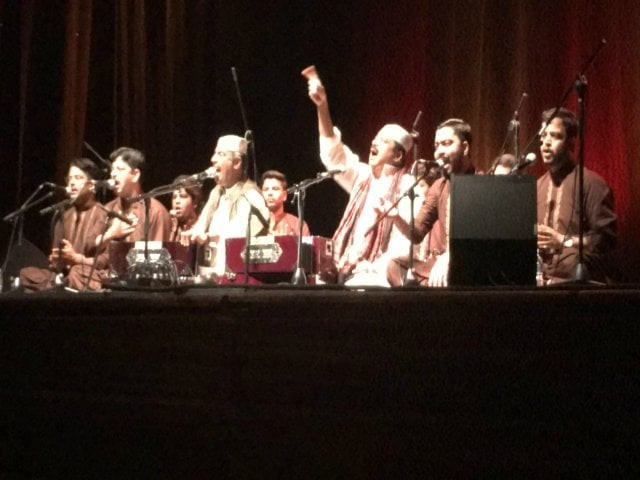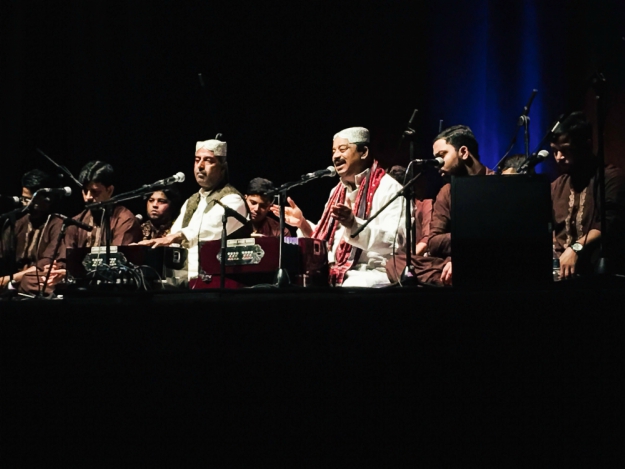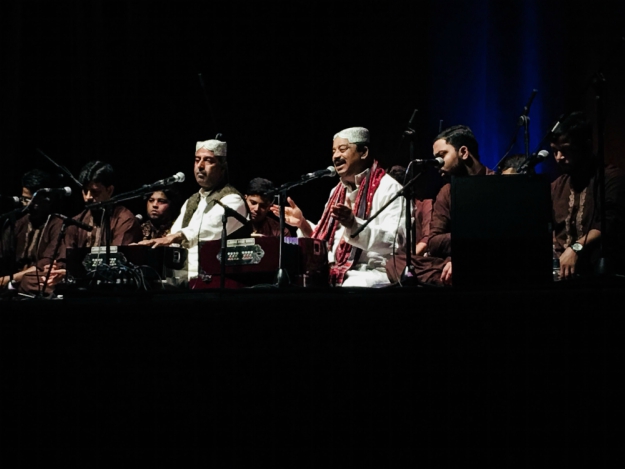Fareed Ayaz’s wit and wisdom keeps Londoners on their feet
Bulleh Shah, Amir Khusrau walked hand in hand as city’s South Asian diaspora celebrated ‘cool version of Islam’

PHOTO: JAFFER MIRZA
Similarly, on Saturday night at the Watford Colosseum in London, I overheard two men in their early 20’s trying to get their heads around qawwali. “I think it’s Islamic music,” one argued. “I think, this is like the cool version of Islam.”
As much as Fareed Ayaz himself will disagree, the audience, particularly the South Asian diaspora living abroad, has continued to perceive qawwali and Sufi poetry as a cool alternate to ‘orthodox Islam.’ It isn’t easy to tell when does the line between the sacred and the profane is blurred during a live performance, unless the qawwal points it out himself as Ayaz did for the London audience. “Please stop whistling. It’s not just entertainment, it is a devotional practice,” he said, after ending Allah Hoo, his first qawwali of the night. Later on, he also mentioned that he has always found nuanced listeners in London.
 PHOTO: JAFFER MIRZA
PHOTO: JAFFER MIRZAAlthough the monitoring system and the sound didn’t do justice to the music at all (someone even shouted “I can’t hear the tabla” from the audience) the qawwals managed to present a unique assortment of kalaams. It is a common trend in a qawwali mehfil to include poetry related to Ishq-e-Majazi (worldly love) after a hamd (in respect of God), a naat (in respect of the Holy Prophet PBUH) and a qol (sayings of the Quran or the Hadith) have been performed.
However, apart from the staple folk poems of Ghulam Fareed and Baba Bulleh Shah, the qawwals – for just a verse or two – even drifted to the famous Marwari folk song from Rajhastan, Kaysaria. This was not only a welcome rhythmic detour from the typical 10-beat-cycle but also served as an acoustic reminder of South Asian soil and its familiar melodies.
It is fascinating to see a canonical figure of the qawwali world cater to an audience that is naïve, yet eager to learn. Representing the 25th generation of Amir Khusrau’s Qawwal Bache, Ayaz used a very engaging mix of wit and wisdom to impart his knowledge of different devotional kalaams without letting the rhythm die. He stressed on the phrase “Bal bal jaaon” while rendering Khusrau’s timeless Chaap Tilak and asked the audience if there is an English translation to it. “There isn’t,” he responded with a laugh. “Yahan koi bal bal nahi jaata, yahan koi waari nahi jaata, yahan koi sadqay nahi jaata.”
 PHOTO: JAFFER MIRZA
PHOTO: JAFFER MIRZAHaving said that, Ayaz did more talking than singing. Some audience members believed he did so to give the younger members a chance to shine and others thought it was him running out of stamina. Indeed, Abu Muhammad’s raw yet melodious voice and Ghayoor Ahmed’s skillful Lehkari added a new tangent to each set piece and gave a glimmer of hope regarding the future of qawwali but Ayaz’s thundering gruff and throw was thoroughly missed.
The two-and a-half hour session ended with Bulleh Shah’s Mera Piya Ghar Aya. As expected, this song was high on dholak and low on tabla, hence creating an explosive mixture of love, desire and longing that culminated in the young and the old, the men and the women, gathering around the qawwals and ending the night on dhamaal. The puritans who were waiting for Khusrau’s Rung to formally conclude the evening were unhappy that even the likes of Qawwal Bache have given into populist demands.
Evenings such as qawwali mehfils and other traditional music concerts also provide an opportunity for the Asian community to dress traditionally and celebrate their own culture while catching up with lost acquaintances. And we South Asians enjoy doing that more than anything else. Even Ayaz was more eager to catch up with the late Amjad Sabri’s elder brother Sarwat (who was also in the audience) after the show, more than fan interactions or Q & A.
Have something to add to the story? Share in the comments below.



















COMMENTS
Comments are moderated and generally will be posted if they are on-topic and not abusive.
For more information, please see our Comments FAQ